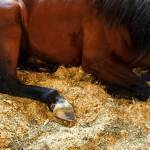Abdominal Health of Horses: Colic Caused by Coronaviruses?

After analyzing fecal samples and searching for the presence of Betacoronavirus 1, data from one study did not support a causative role of coronaviruses in equine colic secondary to colonic disease.*
Equine coronavirus (ECoV) is classified as a species of Betacoronavirus 1, along with the bovine and human coronaviruses. In horses, ECoV can cause severe colic with fever. The clinical signs of ECoV are similar to salmonellosis, a more widely known cause of diarrhea and colic.
“Other organisms associated with enteric disease include Clostridium difficile, Clostridium perfringens, and Lawsonia intracellularis,” explained Catherine Whitehouse, M.S., a nutrition advisor at Kentucky Equine Research.
Despite being associated with colic in some ECoV outbreaks, this virus remains a rare differential diagnosis for most colic cases. A group of Austrian veterinarians conducted a study to investigate whether ECoV is an important cause of colic underdiagnosed by practitioners.
Fecal samples were collected from 105 horses with acute onset colic as well as 36 healthy horses. All samples underwent ECoV testing, which involved isolating, amplifying, and analyzing viral genetic material from the fecal samples. All horses were examined at or admitted for in-patient care at one of three Austrian hospitals.
“ECoV was isolated from only six of the 105 horses with acute colic and one of the 36 healthy horses. Interestingly, bovine rather than equine coronavirus was found in three of the six samples collected from the colicky horses,” Whitehouse said.
Four of the six horses with Betacoronavirus 1 were diagnosed with colonic impactions. The remaining two horses had normal rectal exams, leaving the cause of colic undiagnosed. Because the prevalence of these viruses in this study population was 5%, the research team concluded that these viruses play “no major role as an etiologic cause of colic.”
Thus, rather than being distracted by Betacoronavirus 1, equine or bovine, experts recommend focusing on ways to prevent colic.
Changes in diet and routines can increase the risk of digestive upset. Therefore, help horses navigate diet changes by transitioning feeds and forages slowly, allowing the gastrointestinal microbiome plenty of time to adapt.
Even changing forage type or source (i.e., transitioning from pasture to hay or vice versa) should be done gradually whenever possible. “These diet modifications often receive less attention than when adding in concentrates, but this shouldn’t be the case,” advised Whitehouse.
Maintaining water intake is essential for supporting digestive health and function. This is particularly true for exercising horses.
“Supplemental electrolytes help promote water intake and maintain optimal hydration and electrolyte balance,” Whitehouse said.
Kentucky Equine Research offers several electrolyte supplements, including Restore SR (Restore in Australia), a slow-release formulation that replenishes sodium, chloride, potassium, and magnesium.
*Stummer, M., V. Frisch, F. Glitz, B. Hinney, J. Spergser, J. Krucken, I. Dierkmann, K. Dimmel, C. Riedal, J-M.V. Cavalleri, T. Rumenapf, A. Joachim, M. Lyrakis, and A. Auer. 2023. Presence of equine and bovine coronaviruses, endoparasites, and bacteria in fecal samples of horses with colic. Pathogens 12(8):1043.








